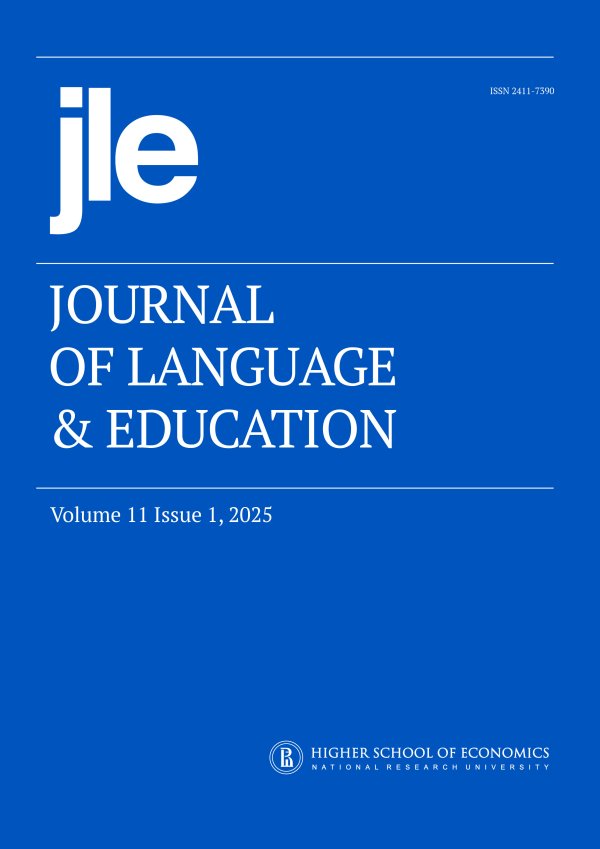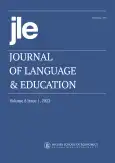Влияние продолжительности учебной программы на убеждения будущих учителей в отношении обучения английскому языку
- Авторы: Siposova M.1, Svabova L.2
-
Учреждения:
- Университет Коменского в Братиславе
- Жилинский университет
- Выпуск: Том 8, № 1 (2022)
- Страницы: 148-166
- Раздел: Оригинальное исследование
- URL: https://journal-vniispk.ru/2411-7390/article/view/299358
- DOI: https://doi.org/10.17323/jle.2022.13288
- ID: 299358
Цитировать
Полный текст
Аннотация
Предпосылки исследования: Убеждения учителей играют важную роль в том, как они преподают и удовлетворяют потребности своих учеников. Исследование убеждений будущих учителей дает основания полагать, что некоторые убеждения могут препятствовать преподавателям соответствовать требованиям обучения.
Пробел в знаниях и цель исследования: во многих исследованиях были получены противоречивые результаты в отношении возможных изменений в убеждениях будущих учителей, сформировавшихся до начала работы под влиянием программ подготовки учителей. Поэтому данное исследование устраняет этот пробел, обогащая эту область результатами исследований, подтверждающими потенциальное влияние учебной программы на изменения в убеждениях будущих учителей в отношении эффективного преподавания и изучения английского языка, которые они выражали в разные годы прохождения учебной программы.
Методы: В исследовании использованы результаты анкет, заполненных 99 случайно отобранными студентами-будущими учителями английского языка, обучающимися на педагогическом факультете Университета им. Коменского в Братиславе, Словакия. Кроме того, база данных участников исследования была расширена с помощью бутстрэппинга для улучшения результатов, полученных при применении статистических методов.
Выводы и значимость исследования: результаты показали статистически значимые различия между разными годами учебной программы в рамках продолжения обучения студентов по программе преподавания английского языка, что свидетельствует о потенциальном влиянии программы. Влияние учебной программы привело к повышению осведомленности будущих учителей и некоторым изменениям в их устоявшихся убеждениях, основанных на усвоенных и приобретенных знаниях и практическом опыте преподавания во время практики в старших классах. Результаты показывают, что преподаватели и методисты должны учитывать убеждения будущих учителей при принятии новых стратегий по переосмыслению и/или изменению программ подготовки учителей иностранных языков.
Об авторах
M. Siposova
Университет Коменского в Братиславе
Email: siposova@fedu.uniba.sk
ORCID iD: 0000-0002-0329-1363
L. Svabova
Жилинский университет
Автор, ответственный за переписку.
Email: lucia.svabova@fpedas.uniza.sk
ORCID iD: 0000-0002-4722-4103
Список литературы
- Abelson, R. P. (1979). Differences between belief and knowledge systems. Cognitive Science, 3(4), 355-366. DOI: https://doi.org/10.1207/s15516709cog0304_4
- Agresti, A., & Franklin, C. (2007). Statistics: The art and science of learning from data (2nd ed.). Pearson Prentice Hall. https://www.pearson.com/content/one-dot-com/one-dot-com/us/en/higher-education/product.html.
- Wheelan, C. (2014). Naked statistics - Stripping the dread from the data. W. W. Norton & Company, Inc.
- Altan, M. X. (2006). Beliefs about language learning of foreign language - Major university students. Australian Journal of Teacher Education, 31(2). DOI: https://doi.org/10.14221/ajte.2006v31n2.5
- Altan, M. Z. (2012). Pre-service EFL teachers' beliefs about foreign language learning. European Journal of Teacher Education, 35(4), 481-493. DOI: https://doi.org/10.1080/02619768.2011.643399
- Ballesteros, A. C. V., Moreno, I. O., & Delgado, L. D. F. (2020). Teaching is not always easy: Mexican pre-service English teachers' beliefs on teaching and learning. Journal of Language and Education, 6(3), 36-51. DOI: https://doi.org/10.17323/jle.2020.10116
- Blume, C., Gerlach, D., Roters, B., & Schmidt, T. (2019). The ABCs of inclusive English teacher education: A quantitative and qualitative study examining the attitudes, beliefs and (reflective) competence of pre-service foreign language teachers. TESL-EJ, 22(4), 1-18.
- Borg, S. (2003). Teacher cognition in language teaching: A review of research on what language teachers think, know, believe, and do. Language Teaching, 36(2), 81-109. DOI: https://doi.org/10.1017/S0261444803001903
- Borg, S. (2006). Teacher cognition and language education: Research and practice. Continuum. DOI: https://doi.org/10.1080/13670050802277076
- Brookhart, S. M., & Freeman, D. J. (1992). Characteristics of entering teacher candidates. Review of Educational Research, 62(1), 37-60. DOI: https://doi.org/10.2307/1170715
- Cabaroglu, N., & Roberts, J. (2000). Development in student teachers' pre-existing beliefs during a 1-year PGCE programme. System, 28(3), 387-402. DOI: https://doi.org/10.1016/S0346-251X(00)00019-1
- Calderhead, J. (1996). Teachers: Beliefs and knowledge. In Handbook of educational psychology (pp. 709-725). Prentice Hall International.
- Capan, S. A. (2014). Pre-service English as a foreign language teachers' belief development about grammar instruction. Australian Journal of Teacher Education, 39(12). DOI: https://doi.org/10.14221/ajte.2014v39n12.9
- Debreli, E. (2012). Change in beliefs of pre-service teachers about teaching and learning English as a foreign language throughout an undergraduate pre-service teacher training program. Procedia - Social and Behavioral Sciences, 46, 367-373. DOI: https://doi.org/10.1016/j.sbspro.2012.05.124
- Fang, Z. (1996). A review of research on teacher beliefs and practices. Educational Research, 38(1), 47-65. DOI: https://doi.org/10.1080/0013188960380104
- Farrell, T. (2019a). ‘My training has failed me': Inconvenient truths about Second Language Teacher Education (SLTE). Teaching English as a Second or Foreign Language - Electronic Journal, 22(4), 1-16.
- Farrell, T. (2019b). Standing on the shoulders of giants: Interpreting reflective practice in TESOL. Iranian Journal of Language Teaching Research, 7(3), 1-14. DOI: https://doi.org/10.30466/ijltr.2019.120733
- Farrell, T., & Yang, D. (2019). Exploring an EAP teacher's beliefs and practices in teaching L2 speaking: A case study. RELC Journal, 50(1), 104-117. DOI: https://doi.org/10.1177/0033688217730144
- Florence, N. (2011). Immigrant teachers, American students: Cultural differences, cultural disconnections. Palgrave Macmillan. DOI: https://doi.org/10.1057/9780230116306
- Florio-Ruane, S., & Lensmire, T. J. (1990). Transforming future teachers' ideas about writing instruction. Journal of Curriculum Studies, 22(3), 277-289. DOI: https://doi.org/10.1080/0022027900220305
- Gao, Y., & Cui, Y. (2022). English as a foreign language teachers' pedagogical beliefs about teacher roles and their agentic actions amid and after Covid-19: A case study. RELC Journal, 1-17. https://. DOI: https://doi.org/10.1177/00336882221074110
- Green, T. F. (1971). The activities of teaching. Mcgraw-Hill.
- Grossman, P. L., Wilson, S. M., & Shulman, L. S. (2005). Teachers of substance: Subject matter knowledge for teaching. Profesorado, Revista de Currículum y Formación Del Profesorado, 9(2), 1-25.
- Hubbard, P. (1983). A training course for TEFL. Oxford University Press.
- Kakeru, A. (2012, May 6). The cultural basis of teaching English as an international language. The Cultural basis of teaching English as an international language. Khaliq's Private Blog. http://khaliqbashar.blogspot.com/2012/05/cultural-basis-of-teaching-english-as.html.
- Kavanoz, S. (2016). Unveiling pre-service language teachers' conceptualizations of teachers of English through metaphors. Journal of Education and Training Studies, 4(10), 17-32. DOI: https://doi.org/10.11114/jets.v4i10.1690
- Kissau, S. P., Algozzine, B., & Yon, M. (2012). Similar but different: The beliefs of foreign language teachers. Foreign Language Annals, 45(4), 580-598. DOI: https://doi.org/10.1111/j.1944-9720.2013.12001.x
- Li, X. (2012). The role of teachers' beliefs in the language teaching-learning process. Theory and Practice in Language Studies, 2(7), 1397-1402.
- Lojova, G. (2009). Re-evaluating the role of theory in foreign language teacher education. In Aspekte der Fremdsprachenlinguistik in der Slowakei und in Ungarn (pp. 123-136). Eotvos-Lórand Universität.
- Mattheoudakis, M. (2007). Tracking changes in pre-service EFL teacher beliefs in Greece: A longitudinal study. Teaching and Teacher Education, 23(8), 1272-1288. DOI: https://doi.org/10.1016/j.tate.2006.06.001
- McCrocklin, S. (2020).Comparing experiential approaches: Structured language learning experiences versus conversation partners for changing pre-service teacher beliefs.International Journal of Society, Culture & Language, 8(1), 70-81.
- McDevitt, B. (2004). Negotiating the syllabus: A win-win situation? ELT Journal, 58(1), 3-9. DOI: https://doi.org/10.1093/elt/58.1.3
- McDonough, S. H. (1981). Psychology in foreign language teaching. Allen & Unwin.
- Nespor, J. (1987). The role of beliefs in the practice of teaching. Journal of Curriculum Studies, 19(4), 317-328. DOI: https://doi.org/10.1080/0022027870190403
- Nettle, E. B. (1998). Stability and change in the beliefs of student teachers during practice teaching. Teaching and Teacher Education, 14(2), 193-204. DOI: https://doi.org/10.1016/S0742-051X(97)00031-0
- Nisbett, R. E., & Ross, L. (1980). Human inference: Strategies and shortcomings of social judgment. Prentice-Hall.
- Numrich, C. (1996). On becoming a language teacher: Insights from diary studies. TESOL Quarterly, 30(1), 131-153. DOI: https://doi.org/10.2307/3587610
- Oxford, R. (2003). Language learning styles and strategies: An overview. Teaching English as a Second or Foreign Language, 41, 359-366.
- Pajares, M. F. (1992). Teachers' beliefs and educational research: Cleaning up a messy construct. Review of Educational Research, 62(3), 307-332. DOI: https://doi.org/10.3102/00346543062003307
- Parkinson, M., Maggioni, L., Olafson, L., & Vander Veldt Brye, M. (2017). The potential of course intervention to change pre-service teachers' epistemological beliefs. In Teachers' personal epistemologies: Evolving models for informing practice (Current perspectives on cognition, learning and instruction) (pp. 215-238). Information Age Publishing Inc.
- Peacock, M. (2001). Pre-service ESL teachers' beliefs about second language learning: A longitudinal study. System, 29(2), 177-195. DOI: https://doi.org/10.1016/S0346-251X(01)00010-0
- Phipps, S., & Borg, S. (2009). Exploring tensions between teachers' grammar teaching beliefs and practices. System, 37(3), 380-390. DOI: https://doi.org/10.1016/j.system.2009.03.002
- Porter, A. C., & Freeman, D. J. (1986). Professional orientations: An essential domain for teacher testing. The Journal of Negro Education, 55(3), 284-292. DOI: https://doi.org/10.2307/2295099
- Richardson, V. (1996). The role of attitudes and beliefs in learning to teach. In Handbook of research on teacher education (pp. 102-119). Macmillan.
- Robb, P. (2005). Culture in language learning and teaching. Cukurova University Journal of Social Sciences, 5(1), 73-84.
- Rokeach, M. (1968). Beliefs, attitudes, and values: A theory of organisation and change. Jossey-Bass.
- Sheridan, L. (2016). Examining changes in pre-service teachers' beliefs of pedagogy. Australian Journal of Teacher Education, 41(3), 1-20. DOI: https://doi.org/10.14221/ajte.2016v41n3.1
- Simsek, M. R. (2020). The impact of service-learning on EFL teacher candidates' academic and personal development. European Journal of Educational Research, 9(1), 1-17. DOI: https://doi.org/10.12973/eu-jer.9.1.1
- Siposova, M. (2019). Language teacher cognition in vocabulary teaching. Studies in Foreign Language Education, 11, 126-163.
- Soleimani, N. (2020). ELT teachers' epistemological beliefs and dominant teaching style: A mixed method research. Asian-Pacific Journal of Second and Foreign Language Education, 5, 12. DOI: https://doi.org/10.1186/s40862-020-00094-y
- Stern, H., & Heinrich. (1997). Fundamental concepts of language teaching. Oxford University Press.
- Strandberg, M. (2013). Homework - is there a connection with classroom assessment? A review from Sweden. Educational Research, 55(4), 325-346. DOI: https://doi.org/10.1080/00131881.2013.844936
- Strevens, P. (1985). Language learning and language teaching. Forum Lectures.
- Svabova, L., Valaskova, K., Durana, P. & Kliestik, T. (2020). Dependency analysis between various profit measures and corporate total assets for visegrad group's business entities. Organizacija, 53(1), 80-90. DOI: https://doi.org/10.2478/orga-2020-0006
- Sysoyev, P. V., & Donelson, L. R. (2002). Teaching cultural identity through modern language: Discourse as a marker of an individual's cultural identity. Journal of Eurasian Research, 2(1), 65-70.
- Uysal, H. H., & Bardakci, M. (2014). Teacher beliefs and practices of grammar teaching: Focusing on meaning, form, or forms? South African Journal of Education, 34(1), Article 1. DOI: https://doi.org/10.4314/saje.v34i1
- Verloop, N., Van Driel, J., & Meijer, P. (2001). Teacher knowledge and the knowledge base of teaching.International Journal of Educational Research, 35(5), 441-461. DOI: https://doi.org/10.1016/S0883-0355(02)00003-4
- Warton, P. M. (2001). The forgotten voices in homework: Views of students. Educational Psychologist, 36(3), 155-165. DOI: https://doi.org/10.1207/S15326985EP3603_2
- Weinstein, C. S. (1988). Pre-service teachers' expectations about the first year of teaching. Teaching and Teacher Education, 4(1), 31-40. DOI: https://doi.org/10.1016/0742-051X(88)90022-4
- Weinstein, C. S. (1989). Teacher education students' preconceptions of teaching. Journal of Teacher Education, 40(2), 53-60. DOI: https://doi.org/10.1177/002248718904000210
- Wilson, J., & Rhodes, J. (2010). Student perspectives on homework. Education, 131(2), 351-358.
- Xu, J., & Yuan, R. (2003). Doing homework: Listening to students, ‘parents,' and teachers' voices in one urban middle school community. The School Community Journal, 13(2), 25-44.
- Yüksel, İ. (2019). ELT pre-service teachers' conceptualization of teaching practice: A metaphor analysis of the dynamics of teaching practice.International Journal of Higher Education, 8(4), 254-265. DOI: https://doi.org/10.5430/ijhe.v8n4p254
- Zhou, G., & Liu, X. (1997). Monograph of educational psychology. China Audit Press.
Дополнительные файлы











